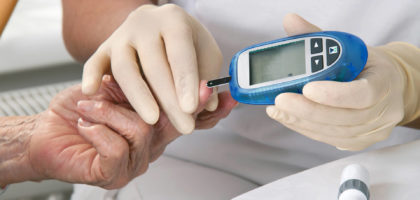Unser Experte für Pituitary Gland
Prof. John AH Wass

Institution und position: Professor Wassis a Professor of Endocrinology at Oxford University (UK) and was the Head of the Department of Endocrinology at the Oxford Centre for Diabetes, Endocrinology and Metabolism, Churchill Hospital Oxford, UK. He also was the President of the European Federation of Endocrine Societies (EFES). He is the Editor of the famous Oxford Textbook of Endocrinology and Diabetes.
March 14, 2018
Die Mitschrift des Interviews mit Prof. John AH Wass zum Thema “Pituitary Gland”
What is the pituitary gland?
The pituitary gland is a very exciting little gland in the head which causes the stimulation of a number of different hormones, including the thyroid, the adrenal glands, and it also causes growth and makes the production of prolactin, which is the hormone, which causes milk, and that’s the anterior gland. The pituitary has also got a posterior gland, the main function of which is to stop you passing too much urine and that’s called antidiuretic hormone.
Where is the pituitary gland exactly?
The pituitary gland is in the middle of the head, just between my fingers there, on the underside of the brain and it’s just underneath the eye nerves and really behind the back of the nose.
What is a pituitary tumor?
Pituitary tumours are divided into two main categories. The first is non functioning pituitary tumours which don’t make an excess of any of the hormones and then there are the functioning pituitary tumours. The commonest of these is the prolactin secreting tumor which makes too much milk hormone or prolactinoma. The second commonest is acromegaly or gigantism in children which makes too much growth hormone. The third is cushing’s disease which makes too much of the hormone that stimulates the adrenal glands and therefore releases too much cortisol, too much steroids.
Does a pituitary tumor grow or make metastases?
Pituitary tumours don’t spread and don’t make metastases in all but very, very exceptional circumstances. There are two main groups, those of the microadenomas which are less than a centimetre and the macroadenomas that are bigger than a centimetre. Virtually never a microadenoma grows but macroadenomas can grow and about 40 or 50% of them grow in 4 years and so, if a macroadenoma is present it does have the propensity to grow, which a microadenoma doesn’t.
What symptoms do non-functioning tumors cause?
Non-functioning tumours can present with all sorts of rather vague symptoms, tiredness and fatigue. They can also cause headaches. They can cause visual problems, because the pituitary tumour enlarges and presses on the eye nerves, so people can’t see out of the sides of their eyes. They can also cause underactivity of the pituitary and perhaps the commonest of these symptoms is loss of periods in women and loss of libido and fertility in men.
What symptoms do functioning tumors cause?
Prolactin-secreting tumors in women cause absent or irregular periods and infertility. They may cause abnormal milk in the breast at a time when the woman is not feeding a baby. In men you can also sometimes see milk in the breast, but it is much less common. They get a low libido and they also have infertility. Growth-hormone or acromegaly and these patients have an enlargement of their hands and feet. They have sweating, they may have high blood pressure, they may have sleep apnea. Children with this condition have too much growth hormone as well and become gigantic or gigantism. Glucocorticoid excess caused by adrenocorticotropic hormone (ACTH) excess from the pituitary causes a number of symptoms that the most predominant of which is a round face, abdominal swelling, and weight gain, and they also have weak muscles most particularly in the legs.
Which investigations are necessary for a pituitary tumor?
You need to measure the hormone levels in patients with suspected pituitary tumours. They may be low in patients with non-functioning tumors and they may be high in patients with functioning pituitary tumors making prolactin, growth hormone, or adrenocorticotropic hormone (ACTH). In those instances, if the levels are abnormal, the patient needs to see a specialist endocrinologist and he or she may organise further tests, which look at the function of the pituitary gland and also do tests to see whether there is a normal response to the excessive hormone level throughout. Then lastly the endocrinologist will do a special MRI of the pituitary to assess the size of the gland.
What is the cause of a pituitary tumor?
We don’t really know what the cause of pituitary tumors is. It’s probably a number of different genes, but importantly there are two things to say: One is that if you’ve got a relative with a pituitary tumor, it’s very, very unlikely you’ll get one too, because these are not predominantly genetic problems. In the very young people or in people who have very big pituitary tumors and by very young I mean less than 30 years old, then they are very occasionally in about 20% genetic, but this is very uncommon.
Which treatments are there for a pituitary tumor?
There are three main treatments for pituitary tumours. The most commonly used is surgery, but this is not required for every patient. Surgery is comparatively simple. It means going through the nose and the patients are only in for between 2 and 5 days. The second group of treatments is with drugs and there are small tumors making prolactin called microprolactinomas and these patients don’t need surgery and they respond in all but exceptional circumstances to drugs. There are other drugs which are used in the treatment of acromegaly to suppress growth hormone, cushing’s disease to suppress ACTH, and then there’s a group of patients who have underactive pituitaries who need hormone replacement therapy for the hormones that are missing, because of their underactive pituitary. There’s a third group of patients who need radiotherapy. This is not often needed, but radiotherapy is very effective at halting tumour growth in over 95% of patients.
What are the long-term risks for a pituitary tumor?
Usually patients who had a pituitary tumour need long-term follow up with a specialist. This is important because of the complications which can very occasionally arise. These include a low risk of underactivity of the pituitary developing, for example after radiotherapy, a low risk of the tumour regrowing, particularly this is rare after radiotherapy, but it can occur if radiotherapy hasn’t been given. Those are the main things. On the whole, the quality of life of patients long-term with pituitary tumours is quite normal.
Is a pituitary tumor a brain tumor?
A pituitary tumour is not really a brain tumour. These tumours may grow, but only occasionally do so and the general outlook of the pituitary tumor is very different to a brain tumour. These patients with pituitary tumours have a very good prognosis, if properly treated by specialists. There’s one rarer tumor that predominantly occurs in children, but it may occur, that is called the craniopharyngioma and that tumour needs to be looked after very carefully with very careful scans over the years, because they may regrow and they may need extra treatment with radiotherapy and so on.
Is there a chance for a cure?
Yes, there’s every chance of a cure. Non-functioning pituitary tumours can be totally removed. What needs to happen over the years is specialist follow-up, just to make sure that the tumour doesn’t regrow and this means serial x-rays over the years. With acromegaly and prolactinomas, these patients can be cured as well and again it needs specialist follow-up to make sure that the situation remains under good control with the drugs or whatever. And with cushing’s likewise. Cure can occur, but recurrence may very occasionally happen, and this again means careful follow up by specialist endocrinologist.
Is the disease inherited?
This disease isn’t usually inherited. There are a very small proportion of patients who have the onset of their pituitary tumour at a very young age, below the age of 30, but in other patients with pituitary tumours there is no inheritance. However, if the patient is under 30 and has a big pituitary tumour, then a very careful family history needs to be taken to make sure that there isn’t anybody else in the family, but this only occurs in 20% or so of those patients.
Can one do something to prevent?
Really, you can’t prevent these tumours, because we don’t know what the cause is, but what you can do is be aware of the early symptoms. So headaches that have been present for a few months which are new. New eye symptoms, which means that you can’t see out of the side of your eyes, or perhaps a change in somebody’s periods or a loss of libido all need to be investigated carefully. Similarly for the functioning tumours, if you have abnormal milk in the breast, if there are abnormal periods or loss of libido again, or in acromegaly if there is excessive growth of the hand so that the rings become tight or in cushing’s if there’s abnormal weight gain and facial redness, then these are symptoms which may relate to a pituitary tumour and should be investigated carefully.
What is actually new about the treatments?
What we’ve realised is that it’s really important for patients with pituitary tumours to be looked after by a specialist team and this means an endocrinologist with a special interest, a surgeon with special expertise, and a neuroradiologist with special experience of looking into x-rays of the pituitary gland. Very occasionally you need a cancer specialist as well.
What are the expected medical advances in this field?
There are new ways of giving testosterone for men now, so that injections actually last 3 months and these were developed in Germany. In the future, there will be new ways of giving hydrocortisone, a steroid hormone, which can be taken once a day and has a dual release and shortly also, there will be treatments in the somatostatin field to suppress hormones such as growth hormone in acromegaly and acth or adrenocorticotropic hormone in patients with cushing’s disease.
Information on the professor
I am the professor of endocrinology in Oxford University in England. I have a special research interest in the pituitary gland. We have published a large number of papers on the subject of the pituitary. I’ve edited the Oxford textbook of endocrinology. I’ve been the president of the European Federation of Endocrine Societies and the president of the Endocrine Society in England.
Information on the institute
Oxford University is a very well-known place in the university world. It’s got a special interest and has had a big department of endocrinology over the last 15 or 16 years and has a special interest in the pituitary gland and research into the pituitary gland, as well as a number of other hormone problems that we’ve been researching over the last 15 or 16 years.
Lebenslauf:
| 1982- 2001 | Committee of Management, Royal Medical Benevolent Fund |
| 1990-1994 | Vice Chairman |
| Since 1992 | Royal College of Physicians, London MRCP Examiner |
| 1992 – 2004 | Royal College of Physicians, Endocrinology and Diabetes Mellitus Committee |
| 1993 – 1995 | Secretary, Association of Clinical Professors, University of London |
| 1994-2002 | Member of Council – Society for Endocrinology |
| 1995-1996 | CMOs (Dept of Health) Advisory Group on Post-Registration Medical Education |
| 1996 – 1998 | President, Endocrine Section, Royal Society of Medicine |
| July 1998 | Member Joint Working Party on Provision of acute general hospital services – a consultation document published jointly by the British Medical Association and the Royal College of Physicians of London and Royal College of Surgeons of England |
| 2000 | Member of the Working Party on the Prescribing of Costly Medicines RCP |
| 2001 – 2003 | President of European Federation of Endocrine Societies (1st UK) |
| 2006 – 2009 | Chairman of the Society for Endocrinology |
| 2006 – 2007 | President of the Pituitary Society (1st UK) |
| 2004 -2006 | Member of International Affairs Committee of the Endocrine Society in the USA |
| Since 2000 | Governor of the Purcell School |
| 1996 – 2012 | Editorial Advisory Board, Medicine International |
| 1991 – 1994 | Editor, Clinical Endocrinology |
| 1994 | Senior Editor |
| since 2012 | Academic Vice President, Royal College of Physicians, London |


















